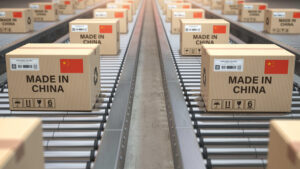The decision made by the USPS may prevent or postpone the entry of packages from online shops such as Amazon, Shein, and Temu.

As President Donald Trump’s trade battle intensified, the USPS abruptly stopped shipping packages from China and Hong Kong on Tuesday.
After abandoning plans to impose charges on Canada and Mexico, Trump permitted a ten percentage point rise in tariffs on Chinese goods to go into effect Tuesday morning. Beijing retaliated by imposing 15% duties on imports of agricultural equipment, coal, liquefied natural gas, and other products from the United States.
Trump’s decision explicitly removed a “de minimis” tax exemption for small quantities and low-value items, including those transported through a postal service, even though the great bulk of goods exported from China arrive outside the mail system. Items under $800 were covered by the exemption.
Packages from stores like Shein and Temu as well as some from Amazon, may be blocked or delayed, at least temporarily, by the mail agency’s action.
According to Kate Muth, executive director of the International Mailers Advisory Group, a prominent trade group that represents shippers and logistics companies, it may also result in major delays for goods being shipped from China to the United States and increase shipping expenses.
“As a consumer, you’re expected to pay more, and it might take a little longer to reach you,” she stated.
In response to the suspension, China’s Foreign Ministry spokesperson Lin Jian called on the US to “stop politicizing economic and trade issues.” At a news briefing on Wednesday, he declared, China will continue to take fundamental measures to relentlessly shield the genuine opportunities and interests of Chinese associations.”
According to a study by the Peterson Institute for International Economics, Temu and Shein are in charge of almost 30% of the parcels that are transported into the US every day. According to a House Republican legislative assessment, China is the source of nearly half of all de minimis shipments.
Since fiscal year 2015, when U.S. Customs and Border Protection reported that there were around 139 million de minimis entries, several trade experts contend that these applications have been the primary driver of the import boom. There were more than 600% more de minimis exceptions in 2023 than there were in that fiscal year. It increased to 1.36 billion by 2024.
During the last weeks of his presidency, President Joe Biden took action to limit de minimis imports, but the regulations were not scheduled to go into effect until after a protracted rulemaking process. Two people familiar with the swift sequence of events, who spoke on condition of anonymity to discuss sensitive economic matters, claim that Trump’s de minimis moves took importers and customs authorities off guard.
According to Muth, the Postal Service needs to collaborate with its Chinese colleagues to implement new de minimis customs screening protocols. “It has completely disrupted the industry, and people are rushing to comply while still having many concerns about how it will operate,” she added.
The Postal Service and Amazon, whose founder Jeff Bezos owns The Washington Post, did not respond to requests for comment.
Rep. Jason T. Smith (R-Missouri), the chair of the House Ways and Means Committee, said in a statement on Tuesday that President Trump is making sure China can no longer evade relevant duties by sending packages with relatively modest values.
The Ways and Means Committee has devoted a great deal of effort to looking into how China and other countries use de minimis to circumvent U.S. law and weaken our trade enforcement tariffs. Increased misuse of the de minimis privilege has unfairly disadvantaged American producers while denying the US government billions of dollars in additional income.
A request for response was not immediately answered by Trump administration officials.
For years, lawmakers from both parties have discussed revising the de minimis tariff exemption. Democrats, however, expressed concern on Tuesday that Trump’s implementation was careless and would cause some e-commerce segments to be disrupted.
The one thing that Trump’s trade war has in common is its lack of vision. Rep. Richard E. Neal (Massachusetts), the top Democrat on the House Ways and Means Committee, told The Post that this is another example of why Congress must establish our trade policy and that it would be readily preventable if someone knew what they were doing.
Conclusion
Trump’s strong trade policies have serious repercussions, as evidenced by the sudden suspension of USPS package delivery from China. The action upends e-commerce behemoths like Shein, Temu, and even Amazon by eliminating the de minimis tax exemption and raising duties on Chinese goods. These rules may unintentionally result in higher pricing and longer shipping times for American customers, even though their goal is to reduce China’s trade advantages. The future of cross-border e-commerce is still up in the air as long as both countries are still negotiating trade.
FAQ
Q1: Why did the USPS halt package deliveries from China and Hong Kong?
A: Trump’s more aggressive trade policies, such as eliminating the de minimis tax exemption and raising taxes on Chinese goods, were the immediate cause of the suspension. USPS found it challenging to continue processing packages from these areas as a result.
Q2: How does this decision affect online shoppers in the U.S.?
A: Customers may see shipping delays or whole blockages from well-known internet merchants such as Amazon, Temu, and Shein. Additionally, because of the policy changes, they might have to pay more for shipping.
Q3: What is the “de minimis” tax exemption, and why was it significant?
A: Goods under $800 could be imported duty-free thanks to the de minimis tax exemption. Due to its removal, customs inspections and duties will now apply to even small, low-value packages, which will increase expenses and delays.
Q4: How did China respond to the USPS package delivery halt and tariff increase?
A: China’s Foreign Ministry promised to defend the interests of Chinese companies and asked the United States to refrain from politicizing trade problems.
Q5: What is the broader impact of Trump’s trade policies on U.S.-China relations?
A: As a result of these policies, trade tensions have escalated, global supply chains have been disrupted, and American consumers and businesses now face higher expenses. They have also stoked discussions over the best ways to control imports and implement trade laws.
THANKS FOR READING

